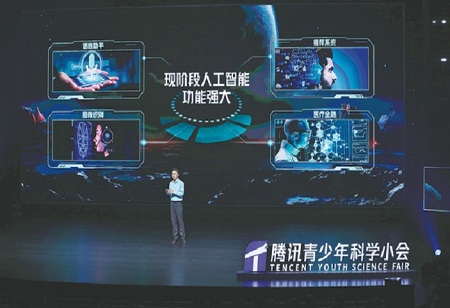Tsinghua University in Beijing hosts a discussion about the expanding influence of AI systems and the necessity of computer science education. Wang Yuanzhuo, a big data and artificial intelligence researcher from the Chinese Academy of Sciences' Institute of Computing Technology, delivered a keynote at the recent Tencent Youth Science Fair. In doing so, he demonstrated a unique duality: he was not only participating in the live Q&A session on the Tencent Video platform, but he was also engaged in educational outreach for rural students via a digital duplicate at the same time. China's digital human technology uses only three minutes of live video footage to generate an identical digital clone, which can help people manage jobs that cannot be done concurrently. Wang, who had been also the scientific consultant for The Wandering Earth 2, envisions a future where, as technology evolves, the portrayal of self-aware digital entities akin to"Yaya" in the film will start to bridge the gap between fiction and reality.
"Every step in the evolution of human technology ultimately stems from our future visions." "However, the future also presents a plethora of intricate issues and challenges," Wang remarked. "I hope that all young people have an insatiable curiosity for the world, a limitless imagination for the future, and the courage to dream beyond conventional boundaries." Tsinghua University, the China Soong Ching Ling Foundation, and Tencent hosted the Tencent Youth Science Fair on August 20 at Tsinghua University.The event, themed Shaping the World with AI, provided a customised One-Day AI Exploration Journey for young people as well as the introduction of a public charity initiative, First Lesson of AI Programming, for testing purposes. Since its inception in 2019, the event has drawn roughly 54 million young participants both online and offline.
The event brought together scientists from research organizations, higher education institutions, and the artificial intelligence sector as part of a unique program related with the 2023 National Science Popularization Day. Shen Beili, vice-president of the China Soong Ching Ling basis, stressed the importance of boosting young people's scientific literacy in bolstering autonomous innovation potential and constructing a solid talent basis for developing a technologically powerful country. AI professionals were asked to engage in direct dialogues with young attendees during the event. "This event serves as a tangible way of strengthening youth science education," added Shen.. According to Li Hang, vice-chairman of Tencent Youth Development Committee, their research, which is carried out in collaboration with the Chinese Association for Artificial Intelligence, revealed that nearly 70 percent of parents consider AI and programming to be highly important subjects for their children to learn. However, over half of the young individuals surveyed had not been exposed to education in AI.
Additionally, the research indicated that 54 percent of parents acknowledged the importance of introducing AI-related education within the context of home-based learning, yet only 0.9 percent of parents were able to implement this effectively. The China Soong Ching Ling Foundation and Tencent are about to launch the mini program First Lessons in AI Programming to provide a foundation in both AI and programming literacy for youths across the nation, even those with no prior knowledge of the subjects. Sun Maosong, vice-dean of the Institute for Artificial Intelligence,Tsinghua University, showcased Jiuge, an AI poetry composition model that he and his team have been developing since 2015, at the event. According to Sun, poetry places emphasis on rhythm, symmetry,profound imagery, and rich, intricate semantic expression.
"Jiuge, drawing from an extensive dataset of classical poetry, was engineered to construct an automated AI poetry and couplet writing system, thereby overcoming the challenges of Chinese language comprehension and analysis in AI,"Sun explains. With a seven-character quatrain composed using Jiuge, he helped young attendees appreciate the fascinating collision of traditional culture and cutting-edge technology. Pan Jiaofeng, head of the Institutes of Science and Development,Chinese Academy of Sciences, pointed out that while China has made remarkable strides, a notable gap in AI foundational technologies remains, especially in AI hardware,in comparison to developed nations. He encouraged the young participants to place emphasis on foundational subjects like mathematics,physics and neuroscience, to contribute to the establishment of an independent and controllable AI technology framework for China's future endeavors.

